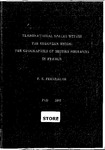Transnational Spaces within the European Union: the geographies of British migrants in France
| dc.contributor.supervisor | Yarwood, Richard | |
| dc.contributor.author | Ferbrache, Fiona | |
| dc.contributor.other | School of Geography, Earth and Environmental Sciences | en_US |
| dc.date.accessioned | 2011-05-13T09:53:33Z | |
| dc.date.available | 2011-05-13T09:53:33Z | |
| dc.date.issued | 2011 | |
| dc.identifier | 200686 | en_US |
| dc.identifier.uri | http://hdl.handle.net/10026.1/454 | |
| dc.description | Mark Wise was also Director of Studies to this thesis (2007-2009), prior to his retirement. | en_US |
| dc.description.abstract |
Tensions exist in the way that the European Union is conceptualised. How do we reconcile the persistence of a Europe of fragmented nation-states and the European integration project based on the principle of free movement? This duality is indicative of different geographical visions: between space defined as places and space defined as unifying flows. While places tend to be associated with fixed territories and borders, it is argued that complex global flows and connections may disrupt such notions. Addressing these theoretical tensions, this thesis examines transnational frameworks for discussing the reconfiguration of borders and spaces within the European Union. The aim of this research is to explore the extent to which European Union citizens, with freedom of movement, experience mobility between member states in a frictionless manner. The thesis adopts a “bottom-up” approach of migrants’ experiences and perceptions of internal borders, as barriers or opportunities to their movement and settlement. This is illustrated through the case of Britons resident in France. The thesis draws on data generated through qualitative methods, including fifty-three in-depth interviews undertaken in an ethnographic setting. The case study demonstrates how a frictionless European space does not exist for ordinary European Union citizens, for a variety of political, legal, economic and socio-cultural reasons. The analysis reveals how Britons recreate (national) state borders, by adapting to French politico-legal structures, and identifying boundaries between “us” and “them”. The thesis also identifies how transnational spaces are created through immigrants’ social networks. By exploring the everyday lives of intra-EU migrants, the thesis contributes to literature on British migrants in France, and provides an original contribution to studies of EU integration, focused on ordinary citizens on the move. | en_US |
| dc.language.iso | en | en_US |
| dc.publisher | University of Plymouth | en_US |
| dc.subject | European Union | en_US |
| dc.subject | British immigrants in France | en_US |
| dc.subject | Intra-EU migration | en_US |
| dc.subject | Transnationalism | en_US |
| dc.subject | Space as flows | en_US |
| dc.subject | EU citizens | en_US |
| dc.title | Transnational Spaces within the European Union: the geographies of British migrants in France | en_US |
| dc.type | Thesis | |
| dc.identifier.doi | http://dx.doi.org/10.24382/4495 |
Files in this item
This item appears in the following Collection(s)
-
01 Research Theses Main Collection
Research Theses Main


